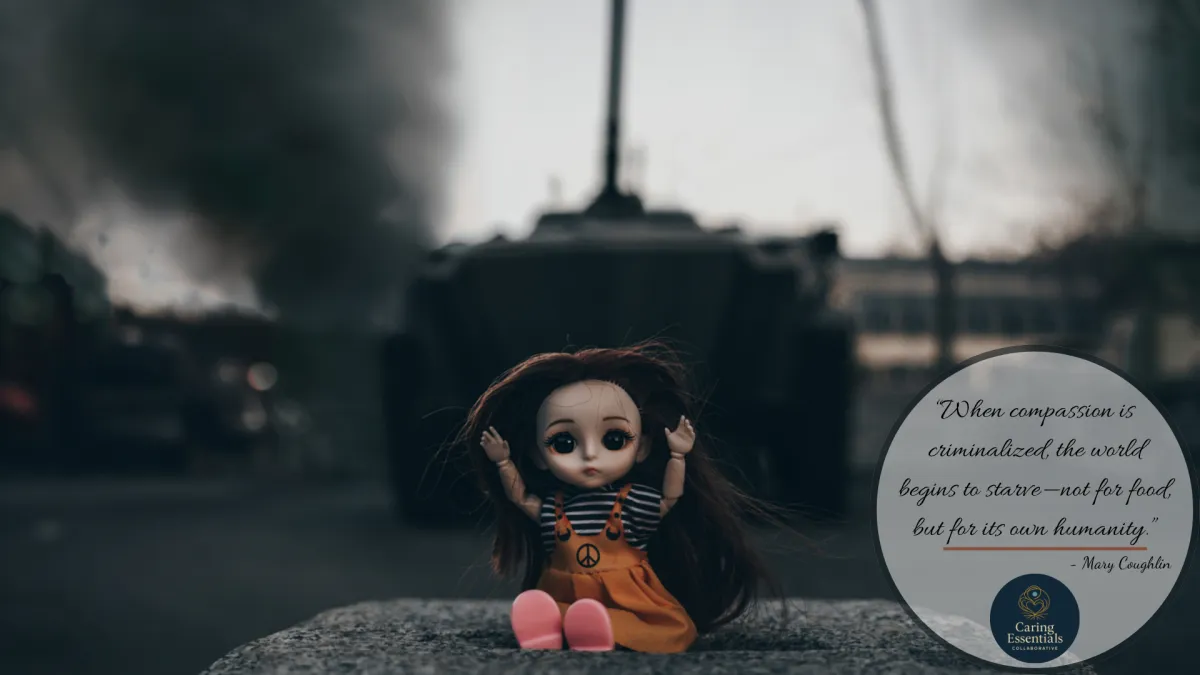
When Caring Becomes a Crime
“When compassion is criminalized, the world begins to starve—not for food, but for its own humanity.”
— Mary Coughlin
A trauma-informed reflection on Greta Thunberg’s detention and the global assault on compassion
On October 1, 2025, a 22-year-old woman boarded a boat carrying baby formula, water, and medicine. She wasn’t armed. She wasn’t hiding anything. She was part of the Global Sumud Flotilla—a convoy of forty-odd vessels attempting to deliver humanitarian aid to Gaza’s two million people, most of them children.
Her name was Greta Thunberg.
When Israeli forces intercepted the flotilla in international waters, the boats were boarded and every person detained. A Turkish journalist later described watching Greta being dragged across the deck and forced to kiss an Israeli flag. She was zip-tied, held without food or adequate water, and later deported. Israeli officials dismissed these reports as lies. Their National Security Minister went further—boasting that he was proud of the harsh treatment and warning future activists to “think twice.”
Greta has now been arrested twice in four months for attempting to deliver food and medicine to starving children.
And the world—especially the West—has met this with little more than a shrug.
The Wound Beneath the Headlines
To look at this story through a trauma-informed lens is to see more than geopolitics.
It is to witness the moral injury of a species that has begun to criminalize empathy.
When a young woman’s attempt to feed hungry babies is met with armed force, what we are really watching is the collapse of relational humanity. It is the nervous system of the world turning against itself—protecting power, not people. The language of “security” becomes a cloak for domination, and the act of caring becomes reclassified as a threat.
For clinicians, teachers, social workers—for anyone who has ever risked tenderness inside a system built on control—this story feels achingly familiar. It mirrors the quiet punishments of compassion in our own institutions: the nurse disciplined for spending too long with a grieving mother, the teacher reprimanded for veering from the script, the leader silenced for naming harm. Greta’s humiliation is not an isolated act—it is the global face of a deeper pattern: a world at war with its caregivers.
The West’s Complicity
Make no mistake—this is not a distant tragedy. The naval vessels that intercepted the flotilla were built with American money. The detention facilities, the surveillance systems, the weapons—all funded by the $3.8 billion in annual U.S. military aid to Israel. When the United States stays silent, it does more than look away. It sanctions the violence of indifference.
This silence reverberates far beyond Gaza. It sends a message to the world: humanitarian law is negotiable; compassion is conditional; justice is expendable. It erodes the moral credibility of Western democracies already trembling under the weight of hypocrisy. We cannot claim to defend freedom while financing the punishment of those who embody it.
And yet, there’s something even more insidious: the slow normalization of brutality. Each unchallenged violation teaches the global nervous system to tolerate more pain, to numb itself to images that should shatter us. The trauma of one nation becomes the template for the desensitization of all.
The Cost of Numbness
This is what collective dissociation looks like—scrolling past the suffering, rationalizing cruelty as “complex,” debating the morality of feeding children. It’s what happens when our social, political, and spiritual immune systems fail. The trauma doesn’t vanish; it metastasizes. It lives in the apathy of bystanders, in the silence of allies, in the moral exhaustion of good people who no longer believe their care can make a difference.
But here’s the truth trauma teaches us: what we refuse to feel, we will reenact. The longer we avoid the grief and rage this moment deserves, the more complicit we become in its repetition. Our healing—personal, national, planetary—depends on our willingness to stay present to pain without turning away.
Reclaiming Compassion as Defiance
There is still time to turn toward the light. Greta Thunberg will recover; she will speak again; she will keep showing up. But the question is—will we?
Will we reclaim compassion as an act of defiance?
Will we demand that our governments stop funding the punishment of caregivers?
Will we remember that every child deserves food before politics, safety before allegiance, dignity before dominance?
To be trauma-informed is to see what violence does not only to bodies but to the soul of a people. It is to remember that our survival is intertwined—that what happens to one of us happens to all. When a 22-year-old is dragged across a deck for carrying baby formula, it is the world itself that is starving—for conscience, for courage, for care.
This is not normal.
And silence is not neutral.
It is time to make compassion ungovernable.
The Quiet Revolution
The story of Greta Thunberg’s detention isn’t only about geopolitics—it’s about the human cost of a world that punishes care. Whether on a boat in the Mediterranean or in a hospital hallway, the question is the same: what happens to us when compassion is treated as disruption? When we turn away from suffering because someone told us it’s not our place, not our problem, not our lane?
Every act of care, no matter how small or inconvenient, becomes an act of resistance against that narrative. And perhaps that’s the quiet revolution we need most—to keep choosing tenderness in a world that has forgotten what it feels like to be human.
Take care and care well,
Mary
